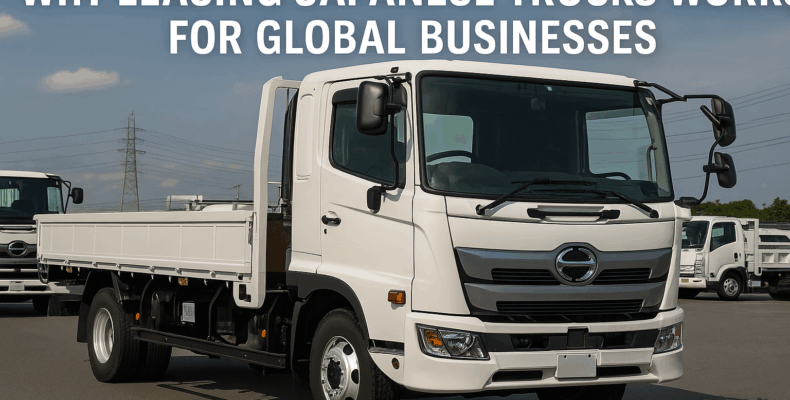Why Leasing Japanese Trucks Works for Global Businesses: Flexible, Reliable, and Cost-Efficient
In today’s fast-changing logistics and transportation industries, flexibility is everything. For many global businesses—whether in Africa, the Caribbean, or Southeast Asia—leasing Japanese used trucks offers a smart, scalable alternative to full ownership.
In this article, we explain why leasing makes sense, what types of businesses benefit most, and how you can get started with trusted Japanese exporters.
1. Lower Upfront Costs = Immediate Savings
Buying a truck requires a large initial investment. Leasing, on the other hand, offers:
-
Lower capital requirements
-
Flexible down payments
-
Predictable monthly costs
This is especially helpful for startups, seasonal businesses, or companies that are expanding quickly but want to control cash flow.
2. Access to High-Quality Japanese Vehicles
Japan is home to some of the world’s best truck manufacturers, including:
-
Isuzu
-
Hino
-
Mitsubishi Fuso
-
Toyota
-
Nissan
Leasing gives you access to late-model vehicles with strong engines, clean interiors, and advanced features—without paying full price upfront.
To ensure quality and professional service, work with experienced exporters. Start here:
👉 Top 5 Trusted Japanese Used Truck Exporters for Global Buyers
3. Simplified Maintenance and Support
Leasing agreements often include maintenance support. This saves you time and money. You can avoid:
-
Sudden repair bills
-
Downtime from mechanical issues
-
Long waits for replacement parts
Additionally, many exporters offer inspections, auction sheets, and maintenance records with every leased truck.
4. Upgrade Easily as Your Business Grows
Your needs may change. For example, you might start with a 2-ton flatbed, then need a 10-ton dump truck for a construction contract. Leasing makes it easy to scale.
Instead of selling your current truck and finding a new one, you can swap or upgrade at the end of your lease term. This keeps your fleet fresh and aligned with your goals.
5. Avoid Depreciation Risk
Trucks lose value over time. When you lease, you avoid this depreciation burden. You use the vehicle during its most efficient years, then return it.
For businesses focused on efficiency and ROI, this is a major advantage.
6. Ideal for Short-Term or Project-Based Use
Sometimes, businesses only need a truck for a specific project—like harvesting season, event logistics, or a construction phase. Buying a vehicle for short use may not be ideal.
Leasing lets you:
-
Match equipment to the project timeline
-
Reduce storage costs when not in use
-
Focus funds on your core operations
7. Easier Budget Planning
Since leasing costs are fixed, it’s easier to plan budgets. There are no surprise repairs, and monthly payments are consistent.
This is especially useful for companies in developing regions, where financial predictability supports better long-term planning.
8. Global Exporters Make Leasing Easy
Professional exporters based in Japan handle the paperwork, shipping, and documentation. Some even provide:
-
Remote video inspections
-
Export certificates
-
Leasing agreements tailored for your country
-
After-sales service
If you want peace of mind, start with trusted professionals like these:
🔗 Top 5 Trusted Japanese Used Truck Exporters for Global Buyers
Conclusion: Leasing Japanese Trucks Is a Smart Global Strategy
For businesses that value flexibility, cash flow, and up-to-date equipment, leasing makes sense. You avoid high capital costs, reduce risks, and stay adaptable in a fast-moving market.
Whether you run a construction company in Zambia, a delivery service in the Philippines, or a logistics firm in Jamaica, leasing can help you grow with less stress.
